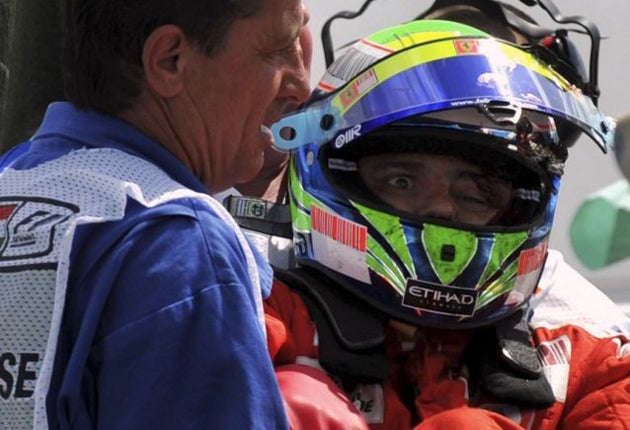James Lawton: Grim return to forgotten edge of fear

Your support helps us to tell the story
From reproductive rights to climate change to Big Tech, The Independent is on the ground when the story is developing. Whether it's investigating the financials of Elon Musk's pro-Trump PAC or producing our latest documentary, 'The A Word', which shines a light on the American women fighting for reproductive rights, we know how important it is to parse out the facts from the messaging.
At such a critical moment in US history, we need reporters on the ground. Your donation allows us to keep sending journalists to speak to both sides of the story.
The Independent is trusted by Americans across the entire political spectrum. And unlike many other quality news outlets, we choose not to lock Americans out of our reporting and analysis with paywalls. We believe quality journalism should be available to everyone, paid for by those who can afford it.
Your support makes all the difference.Felipe Massa's cruelly random injury at qualifying in Hungary – along with the recent death of John Surtees' son – have turned back the clock with almost casual brutality.
They remind us that safety regulations, however thoroughly imposed, are never going to come with guarantees when you are propelling a piece of machinery in serious traffic at speeds adjacent to 200mph.
They also underline the achievement of former world champion Jackie Stewart, who resolved, after attending the funerals of five racers in one calamitous year, that something Formula One chief Bernie Ecclestone, in one of his less guarded moments, described as "natural culling" had reached a point where any further lack of concerted action would amount to nothing less than an entire sport's failure of conscience.
Quite how successfully Stewart waged his battle over the decades is evident in the shock that has greeted Massa's mishap and the tragedy of Surtees Jnr.
Such things are no longer supposed to happen, but they will from time to time because the intrinsic risk in racing so quickly is never going to be removed, not absolutely.
When they do occur it is maybe not idle to regret that along with the welcome dwindling of the worst danger has come a certain lack of status for the men who feel impelled to go, as Jacques Villeneuve once put it, "right to the edge – and hold it there".
There are times when it is impossible not to believe that the racers have become mere appendages to the vital work of the testing track and pit-lane boffins.
It is one reason why the effort to impose rules which will diminish the advantage one team, and one driver, holds over another, should not be mocked by anyone who remembers that the enduring appeal of Formula One is about the skill and panache of the men out on the track and that a shrewd fuel strategy will never begin to match the appeal of some nerveless overtaking manoeuvre.
Massa's crisis, it may not be so easy for a younger generation of Formula One fans to grasp, would once have been greeted as routine hazard, the kind which claimed the lives of such superb drivers as Jim Clark and Ayrton Senna and once threatened the three-times world champion Niki Lauda with incineration at Nürburgring.
It was around about that time, when Lauda was back on the track within weeks of receiving the last rites, that a brief ferry ride was taken from a hotel island to the resort of Bandol the day after the running of the 1976 French Grand Prix at Paul Ricard.
Three drivers were en route to Marseilles airport. There was Carlos Pace, a Brazilian driver of great accomplishment, Patrick Depaillier, a French hero, and Swedish star Ronnie Peterson. It was a sun-splashed morning and this was reflected in the mood of the drivers, even that of Peterson who had been the last of the finishers in 18th place after experiencing difficulties with the fuel system of his March-Ford.
Depaillier had come in second in his Tyrrell-Ford and Pace had just missed the podium in fourth place, driving a Brabham-Alfa Romeo.
Their body language announced that they had everything to live for. They were Hemingway characters confirming the old writer's belief that you had your greatest sense of life whenever you put it at risk. For their only fellow passenger when the boatman tied up at the jetty, the haunting fact is that within two years all three of them were dead.
Pace died in a light aircraft back home in South America, Depaillier received fatal injuries while testing at Hockenheim and Peterson lasted just a night after terrible injuries at the first chicane at Monza. A year earlier John Watson, who finished third that day at Paul Ricard, had described the effect of the Monza chicane in the grimmest terms. "At the start you have 20-odd of the best drivers in the world – then they reach the chicane and turn into a bunch of hoodlums."
The late James Hunt, Clay Regazzoni and Depailler helped drag Peterson from his burning car.
Unwanted memories in an age when Formula One has so successfully attended to a problem that had become quite grotesque, but they are inevitably triggered by the plight of Massa and the fate of Surtees.
Hunt, who took the World title after finishing first at Paul Ricard, had confessed before the race, "Sometimes I think it would be rather nice if I could be a golf champion. Then I wouldn't have to worry that my next race might be my last."
That fear has largely been removed from his successors. However, Massa's terrible misfortune does make an inescapable point, that driving Formula One will never demand less than the highest quality of nerve.
Join our commenting forum
Join thought-provoking conversations, follow other Independent readers and see their replies
Comments